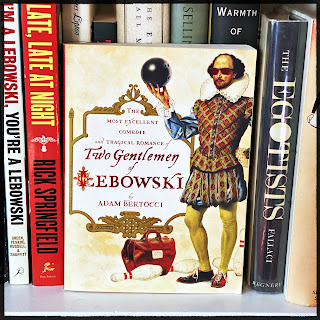My fellow SleuthSayer Bob Mangeot recently shared a marvelous post about a film that is currently celebrating its 25th Anniversary. It’s the only cult film that I can say I truly obsess about, but I will admit that my experience of it is a little strange. Or shall I say, un po’ strano.
The year was 2003. I had left the United States to live overseas with my new fiancé, who covered soccer for ESPN abroad and had an apartment in Rome. My Italian was so rusty that local television was an exhausting blur. Luckily, Denise had bought a number of DVDs of popular American movies at a local DVD shop, and we spent our evenings watching those—again and again and again—after switching off the subtitles and reverting the audio back to the original English dialogue. No matter what we did, however, we could not shut off the Italian subtitles of a film called Il Grande Lebowski.
I remembered seeing the film in a US theater when it arrived in 1998. And while I’d enjoyed it, I did not rush to see it again or acquire the DVD when it was released to the home market. As a result, I never really comprehended just how much a debt the film owed to Raymond Chandler.
But now I did, and in my new temporary home, this very American film unwittingly became my window to another culture. I boned up on my Italian by ceaselessly watching the same Coen Brothers film and slowly associating the English words I heard the actors say with the Italian phrases printed at the bottom of the screen. Over time, my Italian got good enough that I could spot when an American idiomatic expression was rendered poorly in Italian. For example, the nickname of Jeff Bridges’s stoner character, the Dude, is somewhat mistranslated as Il Drugo, but that monicker sorta, kinda makes sense. (As do the other nicknames Drugo suggests in the film: Drughetto, Drugantibus, or Drughino.)
When we returned to the states and settled in the American south, we were delighted to find that we lived not far from Louisville, Kentucky, which hosts an annual LebowskiFest, featuring lookalike contests, bowling tournaments, live music, and two days of tempting merch. One year, we booked travel and lodging, only to cancel when a crop of unexpected freelance work popped up on our radar. Similar fan events are held in other cities, but we’ve never gone. It’s something I hope to do one of these days, but it’s not like I haven’t had my fill of accumulating Lebowski-themed swag.
For many years, the official artist of the Fest has been the LA-based Bill Green, whose style is truly inventive and wonderful. A signed poster of Maude Lebowski (played by Julianne Moore) hangs prominently in our living room, flanked by three bowling pins that Mr. Green has lovingly decorated with a hand-drawn image of the characters. (Three points to the astute reader who can tell me why Maude Lebowski is depicted upside down on one of these pins.) You can find more of Mr. Green’s artwork at his website.
A few years ago, the organizers of LebowskiFest released I’m a Lebowski, You’re a Lebowski, a book of interviews with the actors from the original film. And when some college profs approached them, saying they’d like to present some academic papers about the film at the next fest, the organizers accommodated them, though they admitted that they had no idea this was something brainier fans of the film did in their spare time. The result of these papers is a book entitled The Year’s Work in Lebowski Studies. Before you run out to grab this title, understand that it is a collection of truly academic writing. I love Il Drugo with a passion, but I could not keep up with the writing that flowed from the pens of deconstructionists. Turns out, I don’t need to know the meaning of the word metonym. I passed the book along to a friend with tenure in an English department.
Another writer, Adam Bertocci, later weighed in with a much more palatable book entitled Two Gentlemen of Lebowski, in which every line of the Coen Brothers’ script has been rendered as if penned by the Bard. When two thugs burst into the Dude’s shabby apartment and stumble across his bowling ball, the exchange goes like this:
Thug: (extracting bowling ball from a bag): What the f— is this?
The Dude: Obviously you’re not a golfer.
In Shakespearese, the dialogue goes this way:
Thug: Villainy! Why this confounded orb, such as men use to play at ninepins; what devilry, these holes in holy trinity?
Dude: Obviously thou art not a colfer.
The pages of this book are liberally sprinkled with footnotes and etchings that shed light on Elizabethan phrases, history, and culture. I really enjoyed it, and I rooted for a local theater group in our city that wanted to mount this as a production one year. They were put off the plan only when no one could figure out how they could get the performance rights.
Somewhere in my basement is the ultimate prize—a giant one-sheet movie poster of the Italian film. I dream of showing it off someday. I just need a hunk of wall big enough to display it.
Until I buy a new house, until I demo a corner of the living room, until I build a new wall, I’ll have to make do with my assortment of tiny Lebowski bumper stickers.
As the Dude might say, until then, Il Giuseppe abides.








